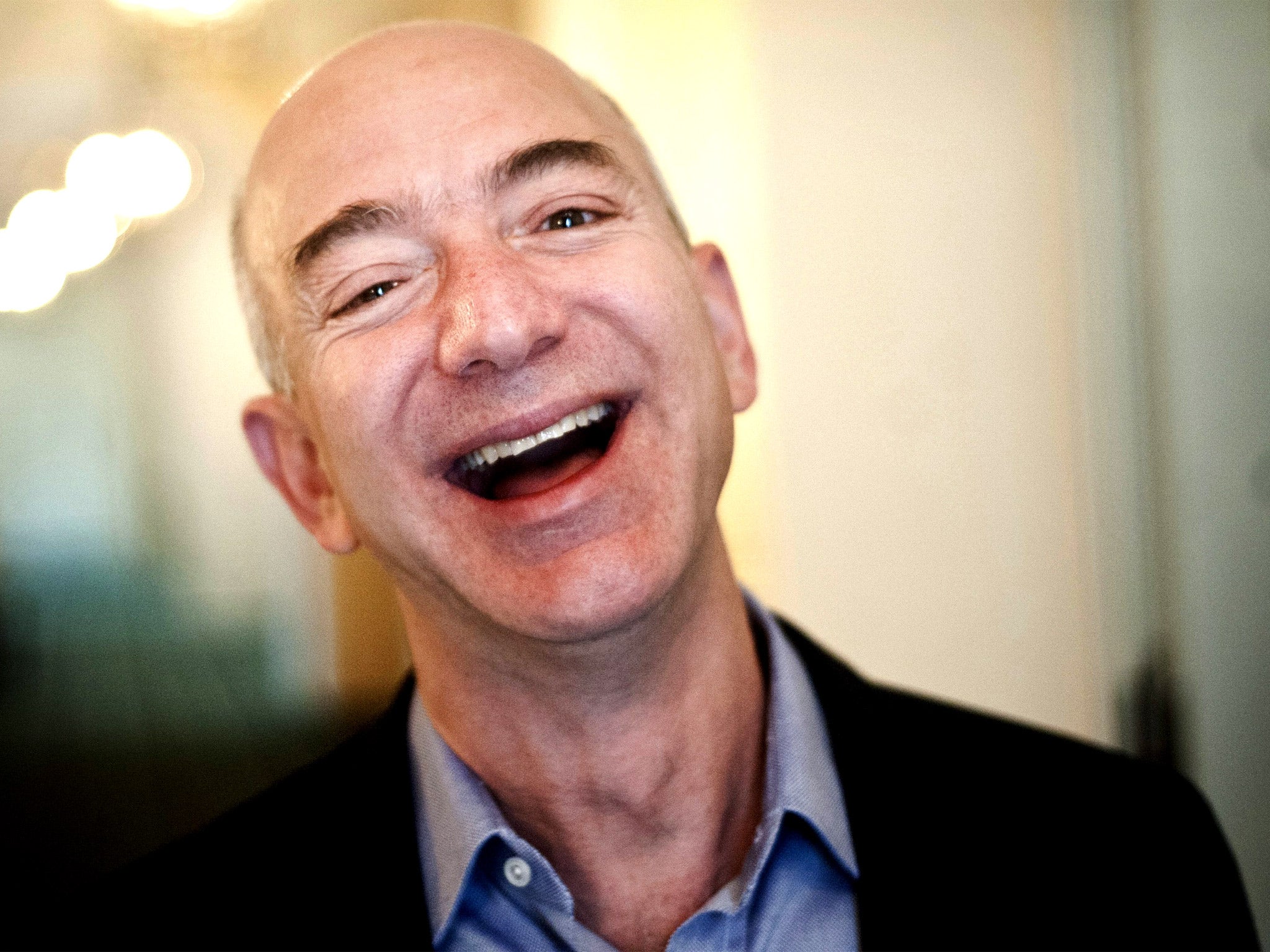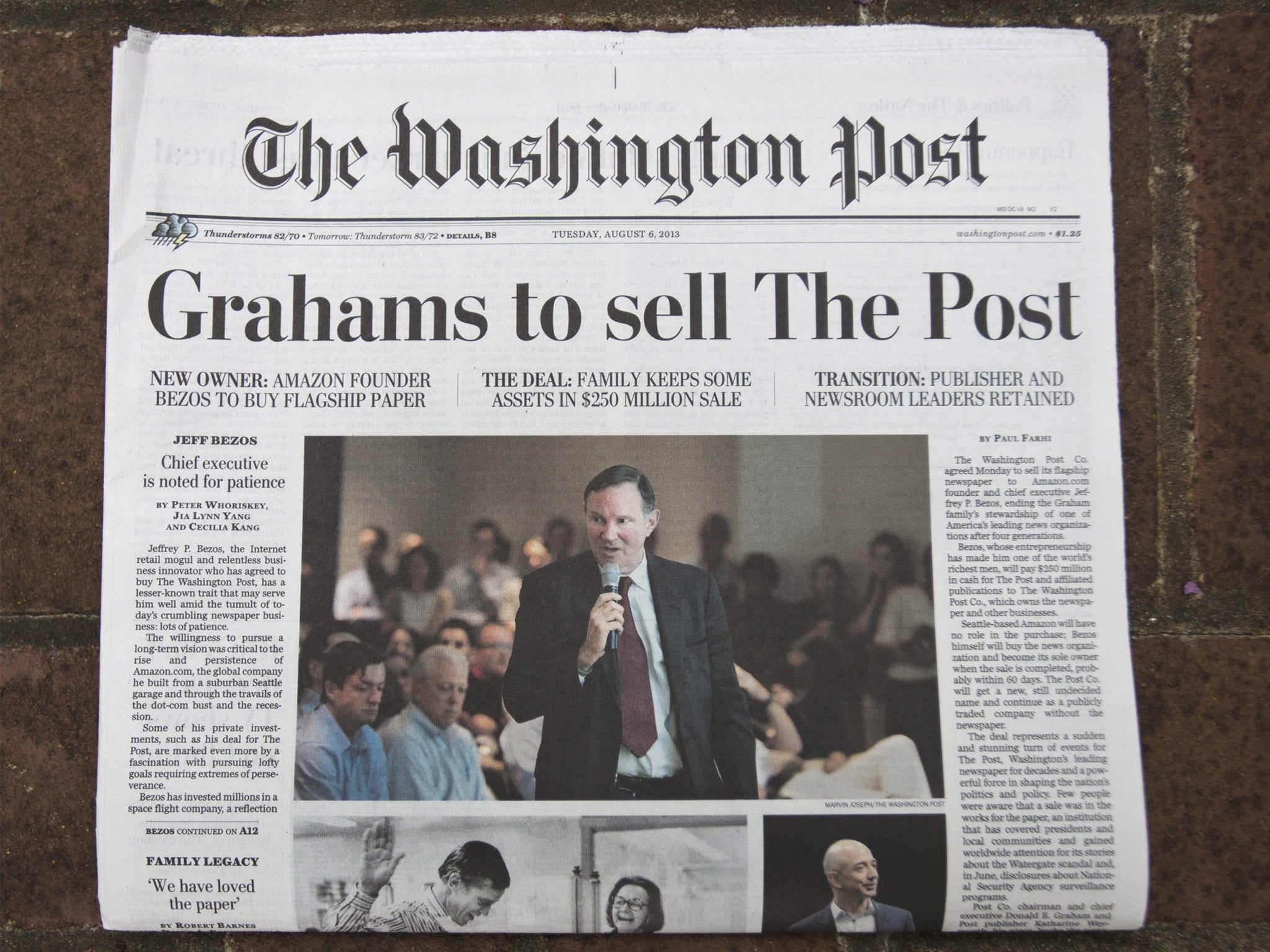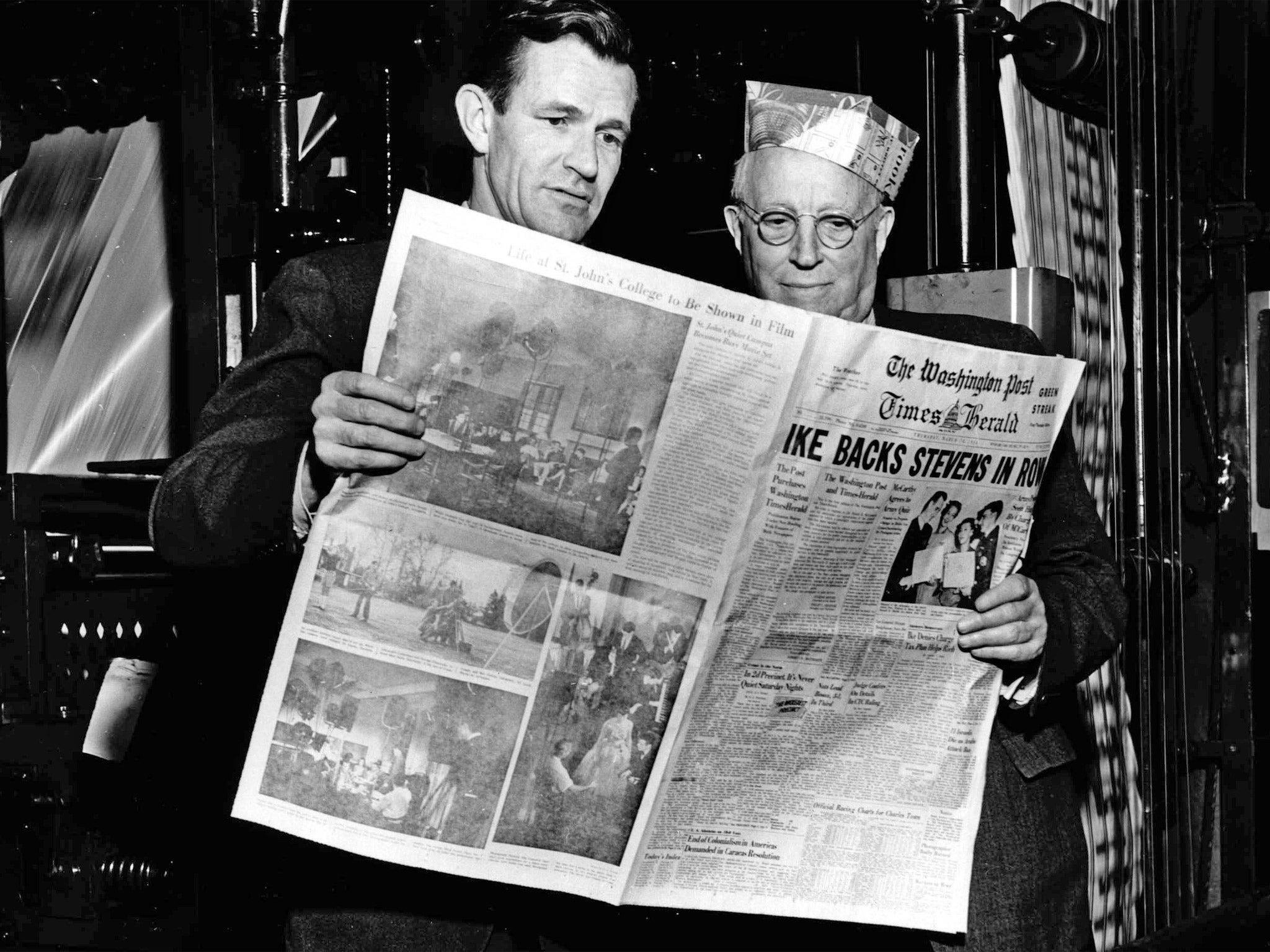Add to basket: Why did dot com king Jeff Bezos buy the Washington Post?
Amazon founder's purchase came from his personal $23bn fortune

Your support helps us to tell the story
From reproductive rights to climate change to Big Tech, The Independent is on the ground when the story is developing. Whether it's investigating the financials of Elon Musk's pro-Trump PAC or producing our latest documentary, 'The A Word', which shines a light on the American women fighting for reproductive rights, we know how important it is to parse out the facts from the messaging.
At such a critical moment in US history, we need reporters on the ground. Your donation allows us to keep sending journalists to speak to both sides of the story.
The Independent is trusted by Americans across the entire political spectrum. And unlike many other quality news outlets, we choose not to lock Americans out of our reporting and analysis with paywalls. We believe quality journalism should be available to everyone, paid for by those who can afford it.
Your support makes all the difference.It was a "Holy Sh*t story", to use a favourite phrase of the Washington Post newsroom grandee Ben Bradlee when describing the kind of impactful tale that might cause a reader digestion problems at the breakfast table.
Except this front page news was not another Watergate scandal - the scoop that won the Post its global reputation - but the revelation that the paper itself has been sold to Amazon founder Jeff Bezos for a relatively paltry $250m (£163m).
"Holy shit" was a popular Twitter reaction among American journalists after the paper's splash headline signalled the end of its relationship with the family that has owned it for 80 years: "Grahams to sell The Post."
Among the paper's staff, there was incredulity. "Like everyone else, I'm shocked," admitted writer Ezra Klein to his readers. "No one in the newsroom really knows what to think of the sale," said his colleague Jim Tankersley. They had all been called to a 4.30pm meeting - but the gossip was that the impending announcement would concern its iconic headquarters building at 1150, 15th Street, which is up for sale.
Instead, the news was of a seismic shift in American media. The founder of one of the Internet's great successes was not merely disrupting a famous traditional business, he was buying it up - and with money from his own pocket.
Bezos's purchase of the "WaPo" came from his personal fortune of $23.2 billion (£15.1 billion) and not as an acquisition by Amazon. The deal was being interpreted in one of two ways by America's media observers.
From some there was a sense of relief. The veteran American newsreader Dan Rather seemed to echo Bradlee when he said that his reaction to the story was "Holy online news, Batman!" On reflection, he concluded that "this will turn out to be a great day for journalism". Ted Leonsis, a former AOL executive who owns two of the city's sports teams, the Washington Wizards and the Washington Capitals, said: "Jeff Bezos is one of the best businessmen in the world and one of the wealthiest individuals on the planet. He will be a fantastic steward of this media property."
In a letter to readers, the Post's publisher Katharine Weymouth said: "This is a day that my family and I never expected to come." Weymouth is the grand-daughter of Katharine Graham, publisher of the paper in 1974 when reporters Bob Woodward and Carl Bernstein (under the guidance of executive editor Bradlee) landed the scoop that caused the resignation of Richard Nixon, America's 37th President. "Mr Bezos knows as well as anyone the opportunities that come with revolutionary technology when we understand how to make the most of it. Under his ownership and with his management savvy, we will be able to accelerate the pace and quality of innovation."
But others were more pessimistic about the deal. It wasn't just a matter of Bezos showing confidence in the future of journalism - the transaction was also a result of the Grahams being desperate to sell up, and Bezos is a friend of the family. Donald Graham, chairman and ceo of The Washington Post Co, said later that he and Bezos only started discussing the deal less than a month ago.

On the Post's own "Wonkblog", Klein noted that investment firm Allen & Co had been hired to find a buyer and that "a half-dozen potential suitors" had been approached before Bezos, 49, took his wallet out. And then there were the questions of how the paper's local coverage might suffer when Bezos lives in Washington State (Amazon is based in Seattle) and not the capital, and whether the Post's journalism might be compromised by "Amazon's political interests" (the company continues to attract negative headlines over its tax arrangements and labour practices).
Marcus Wohlsen of Wired had similar concerns. Observing the irony of "one of the 21st century's most media-shy tech moguls" buying a newspaper, he suggested that Bezos might be "seeking a more influential platform in the nation's capital". Only days earlier, Barack Obama had visited an Amazon warehouse and talked up the company's value as a job creator.
Bezos sought to allay any fears of a hidden agenda in a letter to the WaPo staff. "The values of the Post do not need changing," he assured them. He already had a "day job" and the paper had an "excellent" leadership team that "knows much more about the news business than I do". But "of course", there would be change because "the Internet is transforming almost every element of the news business". None of the journalists could argue with that.
But the letter still didn't answer why he had made the purchase. Although Bezos has "a fondness for the written word", he has never been a cheerleader for print media. Several years before Amazon launched the Kindle, he told the Wittgenstein blog: "God did not create the word because they were written on dead trees." By last year, Amazon was selling 114 Kindle e-books for every 100 hardbacks and paperbacks.
Businessweek writer Brad Stone, who is writing a book called The Everything Store: Jeff Bezos and the Age of Amazon admitted that the Post buy-up would cause him to undertake a "bit of updating" before he publishes in October. "Jeff has said Amazon has placed a big bet on disrupting what he calls the old gatekeepers, the institutions forged in an analogue age that stand between creators of content and consumers," Stone told New Republic. "Now he has gone and personally acquired what is one of the biggest and most well-known gatekeepers out there."

But he also noted the Amazon founder's love of experimentation. Bezos is building a space travel company on his own land in the Texas desert. He is also investing in a clock that might last for 10,000 years and has paid for Apollo 11 rockets to be lifted from the ocean floor. The future of newspapers is another challenge.
Amazon's finances show that he has a strange relationship to making profits. The company made a loss last year while generating huge sales growth and revenues of more than $60 billion. The site made $610m in annual advertising revenues. But shareholders seem to appreciate the Bezos strategy for dominating all things retail and Amazon has a current market capitalisation of $116 billion (£76 billion).
Henry Blodget, editor of the Business Insider blog (which Bezos invested in earlier this year) said that the billionaire would expect ownership of the Post to be "interesting, fun and cool". But it will be more than a plaything - unlike most financial investors (and most media owners), Bezos thinks long-term.
Although this isn't an Amazon deal, Blodget predicted that Bezos would be hoping that Washington Post content might be used to drive sales of Kindles and subscriptions for Amazon Prime (an elite service that includes film and television streaming in America). The paper's web traffic could also boost Amazon shopping, he suggested.
Jeff Bezos is an innovator and he will have his ideas for transforming the fortunes of one of the world's great newspapers. The Washington Post loses $50m a year but, with this momentous deal costing him less than 1 per cent of his net worth, the billionaire made a quick decision: "Add to Basket".
Timeline: The Washington Post
1930s: Eugene Meyer, Katharine Graham’s father, buys the then bankrupt Washington Post for $825,000 in a public auction on the steps of the paper’s headquarters, on June 1, 1933. In those days, the Post was a distant second to the city’s main paper, the Washington Star.
1940s: Don Graham, Katharine’s husband, takes over from his father in law as publisher in 1947, becoming president of the newly formed Washington Post company.
1950s: the Post merges with its morning rival the Washington Times-Herald in 1954. But the Star, an evening paper, is still the dominant force.
1960s: In 1961 the Post Co. acquires Newsweek magazine. Katharine Graham becomes publisher, after the suicide of her husband in 1963. In 1968 Ben Bradlee becomes executive editor. As the surburbs grow, posing problems for an evening paper, the Post starts to supplant the Star.
1970s: The glorious decade, of the Pentagon Papers publication (1971) and the paper’s tenacious coverage of the Watergate scandal, when for months the Post was virtually alone in pursuing the story that would bring down President Nixon. The paper also wins a historic strike battle with the print union in 1975. Sales rise from 500,000 to 600,000 daily.
1980s: The Post Co. diversifies, opening a new printing plant, moving into cable TV, and buying Kaplan, a lucrative for-profit education company. Sales climb to almost 800,000, after the closure of the Washington Star in 1981.
1990s: The fat years, and also the changing of the guard. Sales hit a peak of 832,000 in 1993. Bradlee retires in 1991, replaced by Len Downie. In 1993 Katharine Graham’s son Don takes over as chairman of the Washington Post Co. Three years later, the paper starts its website, Washingtonpost.com
2000 – present: The Post initially continues to expand, launching a free commuter daily and buying the online magazine Slate, but sales slide, hitting 474,000 in March 2013. Retrenchment follows, with the closure of many bureaus, redundancy programmes and the sale of struggling Newsweek in 2010, for $1. In July 2013 the Post is sold to Amazon founder Jeff Bezos.
Subscribe to Independent Premium to bookmark this article
Want to bookmark your favourite articles and stories to read or reference later? Start your Independent Premium subscription today.
Join our commenting forum
Join thought-provoking conversations, follow other Independent readers and see their replies
Comments